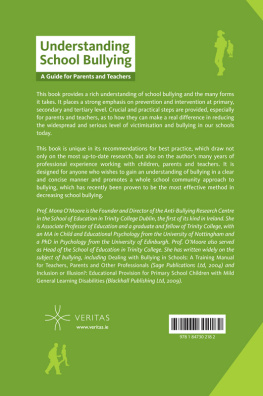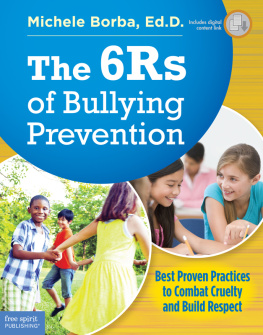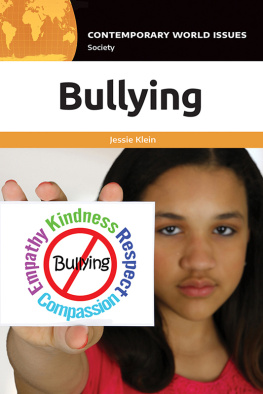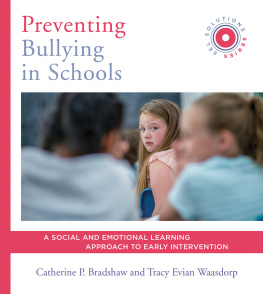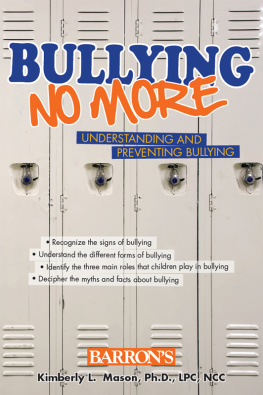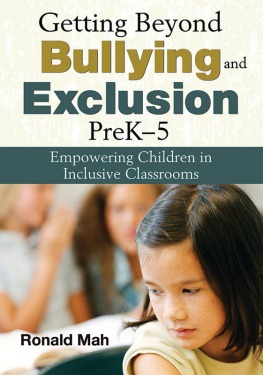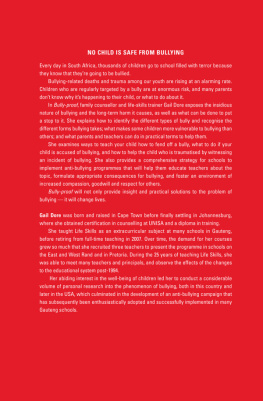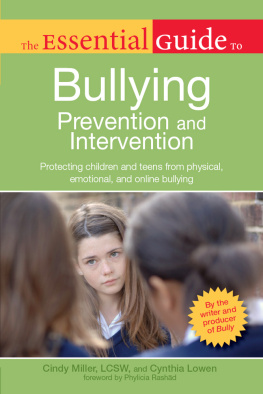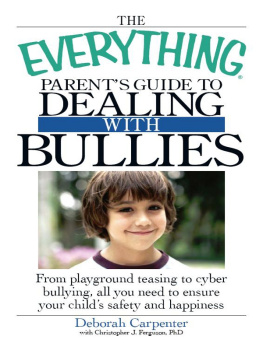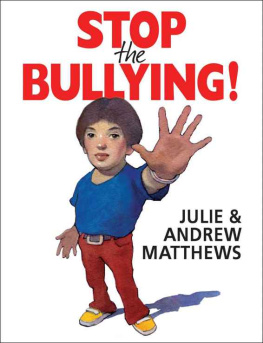UNDERSTANDING SCHOOL BULLYING: A GUIDE FOR PARENTS AND TEACHERS
Mona OMoore
Understanding School Bullying
A Guide for Parents and Teachers

Published 2010 by Veritas Publications
78 Lower Abbey Street, Dublin 1
Ireland
www.veritas.ie
ISBN 978-1-84730-218-2
Copyright Mona OMoore, 2010
10 9 8 7 6 5 4 3 2 1
The material in this publication is protected by copyright law. Except as may be permitted by law, no part of the material may be reproduced (including by storage in a retrieval system) or transmitted in any form or by any means, adapted, rented or lent without the written permission of the copyright owners. Applications for permissions should be addressed to the publisher.
A catalogue record for this book is available from the British Library.
Cover designed by Norma Prause-Brewer
Typesetting by Barbara Croatto
Printed in Ireland by Hudson Killeen, Dublin
Veritas books are printed on paper made from the wood pulp of managed forests. For every tree felled, at least one tree is planted, thereby renewing natural resources.
To my family
and to the memory of my parents,
Astrid and Thorleif Dahl,
and to my eldest brother, Thor.
ACKNOWLEDGEMENTS
I would like to take this opportunity to thank all the school principals, teachers, parents and students who have contributed to my understanding of bullying by their participation in the research conducted by the Anti-Bullying Centre (ABC), Trinity College Dublin. I am also indebted to those who have shared their stories of bullying with me and greatly regret not always having found the time to reply to the many touching written accounts. Without their contributions, this book would not have been possible. I would also like to pay tribute to my family for their patience and forbearance when my mind was elsewhere, but no further than trying to advance the cause of bullying prevention. Finally, I would like to express my thanks to my colleagues for their good cheer and support, especially to Lian McGuire and Murray Smith, who have been the backbone of ABC since its inception.

INTRODUCTION
Being bullied is something that stays with you for life.
At this very moment, somewhere in Ireland, there are children and teenagers who have finished a day of school that should have been about learning, personal growth, friendship and security. But this will not have been everyones experience. For some it will have been another sad and lonely day where their sense of well-being, confidence and trust was further eroded. For others, today may have brought a new and entirely unwelcome experience: the first day that they have tasted victimisation. Perhaps this first day of bullying may bring many months or years ahead of fear, loneliness and despair, forever changing their perception of school.
Every child has the fundamental right to feel safe in school and be spared the oppression and repeated, intentional humiliation caused by bullying. Optimal learning will be achieved only when children feel safe. Unfortunately, this viewpoint is all too often ignored, as can be illustrated by a fathers e-mail to me concerning his fifteen-year-old son. He wrote: My son, Chris, is intelligent, quick-witted and is fun and interesting to be around. He has always been liked and admired by his teachers, but despite this, Chris has been constantly bullied since his first day at school. He further wrote that things came to a head and that Chris could no longer face his tormentors. When I arranged to meet Chris he had already lost a whole year of school due to the physical and psychological ill-effects of bullying.
School bullying is not a new problem, but it is, thankfully, receiving greater attention now than in years past. Why so? One reason is that the pervasiveness and the insidious nature of bullying is increasingly being documented and reported on worldwide. While the extent of the problem within and between countries is debated, there are few who dispute its widespread nature and the damage it may cause.
Evidence is also mounting to show that children and adolescents who are bullied or who bully others, and indeed those who have remained silent witnesses to bullying, can suffer serious social, emotional and physical ill effects. The ill effects whether they be increased anxiety, diminished self-confidence or self-worth, fear of failure, self-harm, depression and attempts at suicide may not only be short term or long term, but even lifelong. Bullying does not need to be endured for long before serious consequences set in. One mother, exasperated with the deterioration of her sons well-being, told me, In the space of a month, the effect on my previously outgoing and happy-go-lucky son has been devastating.
There is no doubt that being subjected to bullying can hold children and adolescents back from achieving their potential not only scholastically, but also in other extra-curricular activities, such as sports. Their confidence and self-esteem suffer. Many underachieve in school as their distress conflicts with their concentration and causes them to lose the capacity to learn. Others drop out of school in order to escape the continuing torment and embarrassment of being bullied. Indeed, there are many adults today who feel that they would have been happier, more successful and fulfilled had they been spared the wilful and systematic abuse hurled at them in a persistent and seemingly relentless way. This can be illustrated by a former victim who wrote the following to me:
I am a sixty-two-year-old woman and my life is wrecked because of bullying in school. In my case it was mental, all of it by girls starting in National School and continuing in the few years that I spent in secondary school. I had such a low self-esteem; if my mother, Lord be good to her, had time she would have noticed the huge change in me. I became more moody, crying a lot. I tried and thought about suicide definitely. Then when I got a bit older, by that I mean fifteen and a half, I really hadnt a clue and took comfort in men. I never thought I was used by men until now. But I sure was. All I say is keep advising parents that it ruins lives. I got married and lost my husband twenty-three years ago. I went back to school a few years ago and got distinctions in all my subjects. It really still hurts that I was so stupid. I cant underestimate how my whole life was ruined. I left out depression how could I not have that on top of the list?
If we accept Maslows theory, as formulated in his book Motivation and Personality, that our needs are arranged in a hierarchy starting with our physiological needs (food, water, sleep and warmth), followed in turn by safety needs (security and freedom from threats), belongingness and love needs (affiliation), esteem needs (achievement, recognition) and, finally, self-actualisation (developing potential talents or capabilities) and that the higher needs (growth needs) can only emerge as the lower ones (the deficiency needs) are fulfilled, then it is predictable that bullied children will switch their attention and efforts from learning to keeping safe. It is only when pupils feel loved, accepted and admired that they are likely to be interested in learning. A sense of security and freedom from threat also brings with it the courage to seek new experiences providing the person with further opportunities for growth and fulfilment.
The findings of the World Health Organisation have greatly helped to raise the profile of school bullying. Most importantly they have highlighted the need to urgently address the issue of school bullying. In their investigation of thirty-five countries, they found that only 35 per cent of all young people in the age group of eleven to fifteen were not involved in any fighting, bullying or victimisation. Their report further highlighted that peer aggression and victimisation is a significant obstacle to healthy educational, social and emotional adjustment, and that without intervention, the young people involved are likely to be trapped in a snowballing pattern of negative interaction with family, teachers, peers and romantic partners.
Next page
